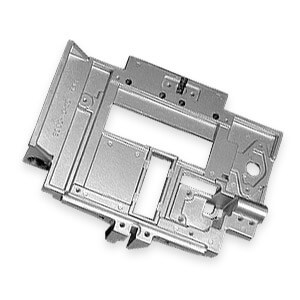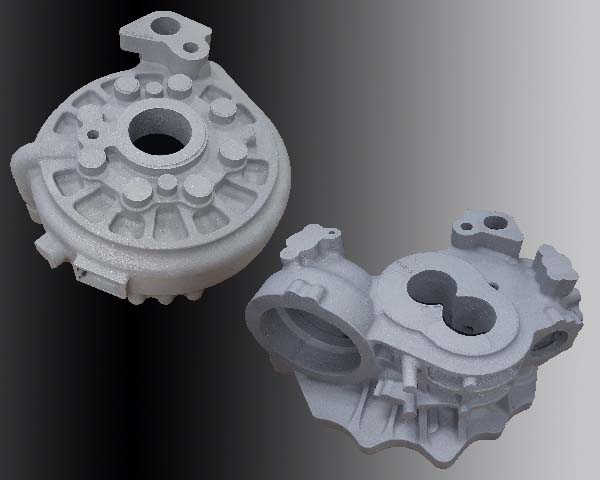Aluminum casting techniques that deliver durable components
Wiki Article
Exactly How Light Weight Aluminum Foundries Add To Different Industries: A Detailed Review
Aluminum foundries work as vital distributors throughout numerous industries, including vehicle, aerospace, building, and electronic devices. They produce components that are not only light-weight but additionally durable, boosting the efficiency of various items. With advanced casting strategies and a commitment to sustainability, these shops are adjusting to meet advancing market demands. As they innovate, the influence of aluminum castings on different applications increases crucial concerns concerning the future of production. What exists in advance for this vital market?The Function of Light Weight Aluminum Foundries in the Automotive Industry
As the vehicle sector increasingly embraces lightweight products to boost fuel efficiency and performance, aluminum shops play an essential function in this evolution. These facilities concentrate on the production of aluminum castings, which are crucial elements in modern-day vehicles. By giving high-strength, light-weight parts, light weight aluminum factories allow makers to lower the overall weight of vehicles, ultimately leading to improved gas economy and minimized discharges.Light weight aluminum's resistance to corrosion further boosts lorry long life, making it an eye-catching option for car manufacturers. Foundries use advanced techniques such as die casting and sand spreading to create complex and specific parts, guaranteeing that they meet stringent sector standards. Furthermore, the ability to recycle light weight aluminum effectively adds to a much more sustainable manufacturing process. As the automobile industry remains to innovate, light weight aluminum factories will certainly stay essential in providing the materials necessary for the future generation of cars, supporting both performance and ecological goals.

Aerospace Applications of Aluminum Castings
Aluminum castings are essential to the aerospace industry, offering a mix of lightweight stamina and toughness that is vital for aircraft efficiency. These spreadings are utilized in various components, such as engine parts, structural structures, and landing gear, where weight decrease is vital for gas performance and general safety and security. The flexibility of light weight aluminum enables intricate geometries that boost wind resistant performance while keeping structural integrity.Developments in casting technologies have boosted the precision and surface area coating of light weight aluminum components, minimizing the demand for considerable post-processing. This effectiveness not just speeds up manufacturing timelines however additionally reduces prices, making light weight aluminum an appealing option for suppliers. The deterioration resistance of aluminum guarantees long life and integrity in harsh operating settings, additionally developing its function in aerospace applications. As the market develops, aluminum castings remain to be a vital material, driving advancement and supporting the growth of next-generation aircraft.
Building Market Innovations With Aluminum
The building and construction market has actually increasingly taken on light weight aluminum due to its lightweight homes and adaptability, paralleling its successful applications in aerospace. Innovations in light weight aluminum design have led to more powerful, more reliable structures, allowing building contractors and architects to discover brand-new opportunities. The material's resistance to corrosion and low maintenance requires make it especially appealing for both industrial and household jobs.Aluminum's convenience facilitates the development of complex styles, enabling visual enhancements that were formerly difficult with traditional materials. Prefabrication methods have additionally developed, making use of light weight aluminum to reduce construction time and prices considerably. Furthermore, the energy efficiency of light weight aluminum systems-- such as window frameworks and roof-- contributes to sustainable building techniques, straightening with modern-day environmental requirements. As the building market proceeds to welcome these improvements, aluminum's duty is expected to broaden, driving further advancement and adding to the growth of durable infrastructures.
Electronics and the Need for Lightweight Light Weight Aluminum Parts
With the fast advancement of modern technology, the need for lightweight aluminum parts in the electronic devices industry has actually surged. As tools become more portable and compact, makers look for products that use both resilience and weight decrease. Aluminum, with its exceptional strength-to-weight ratio, has arised as a recommended option for elements such as housings, heat sinks, and structural assistances.The usage of aluminum not only boosts product performance yet also adds to power efficiency, as lighter gadgets call for much less power during operation. In addition, aluminum's outstanding conductivity makes it ideal for digital applications, making certain effective heat dissipation and minimizing the risk of overheating.
As consumer preferences shift towards lightweight and smooth devices, light weight aluminum shops play an essential function in meeting the advancing demands of the electronic devices industry (aluminum casting). Their capability to create top notch and accurate light weight aluminum elements supports innovation, allowing suppliers to press the boundaries of style and performance
Lasting Practices in Aluminum Foundries
As the electronics sector progressively prioritizes sustainability, aluminum foundries are adapting their methods to straighten with these environmental goals. Many factories are executing reusing programs that reclaim light weight aluminum scrap, substantially lowering the requirement for resources and reducing waste. By utilizing energy-efficient technologies, these centers are decreasing their carbon footprint; as an example, utilizing electrical heating systems as opposed to traditional gas-fired ones can lead to substantial energy financial savings.Additionally, aluminum factories are buying water preservation actions, such as closed-loop systems that recycle water used in cooling down procedures. These methods not just reduced this website water intake however additionally minimize the ecological effect connected with wastewater discharge. Many factories are checking out sustainable energy sources, such as solar and wind power, to meet their power requires sustainably. With these campaigns, aluminum shops exhibit a dedication to ecological stewardship while proceeding to fulfill the demands of the electronic devices sector.
Future Trends in Aluminum Shop Technologies
Emerging innovations are poised to change light weight aluminum factories, enhancing performance and product quality while progressing sustainability initiatives. Developments such as expert system and maker knowing are anticipated to enhance production processes by predicting devices failings and enhancing source allotment. The assimilation of sophisticated robotics will certainly enhance operations, reducing labor prices and lessening human mistake.Additive production, or 3D printing, is additionally gaining grip, enabling the manufacturing of intricate geometries that were formerly unattainable with traditional techniques. This change might bring about significant product cost savings and lowered waste. Additionally, clever factories making use of IoT (Net of Points) innovations will certainly enable real-time tracking and information analysis, fostering aggressive decision-making.
The adoption of cleaner melting innovations and recycling strategies will certainly better decrease the ecological footprint of aluminum foundries, making them more lasting. Jointly, these patterns signal a future where aluminum factories can run with better performance and obligation.
Frequently Asked Questions
What Are the Environmental Effects of Light Weight Aluminum Foundries?

How Do Foundries Make Sure Quality Control in Aluminum Spreading?
Shops guarantee top quality control in light weight aluminum casting by implementing rigorous assessment processes, making use of innovative modern technology, carrying out routine material screening, and adhering to sector criteria, therefore preserving uniformity and dependability in their completed products. aluminum casting.What Is the Average Lifespan of Light Weight Aluminum Cast Parts?
The typical life expectancy of light weight aluminum cast components generally varies from 10 to half a century, depending upon variables such as ecological conditions, usage, and maintenance. Correct care can greatly improve their resilience and efficiency reference gradually.Just How Are Aluminum Alloys Selected for Certain Applications?
Light weight aluminum alloys are picked based upon factors such as stamina, rust resistance, weight, and thermal conductivity. Designers examine the certain demands of applications to establish the most appropriate alloy for ideal performance and sturdiness.What Are the Safety And Security Regulations for Light Weight Aluminum Factory Employees?
Safety policies for aluminum factory workers include personal safety tools mandates, ventilation needs, direct exposure limits to harmful products, and protocols for dealing with molten steel. Conformity assurances worker safety and reduces health and wellness dangers connected with shop procedures.As the vehicle sector increasingly welcomes light-weight products to improve fuel performance and performance, aluminum foundries play a critical function in this development. As customer preferences change towards streamlined and lightweight gadgets, aluminum shops play a crucial duty in fulfilling basics the advancing needs of the electronics industry. As the electronics sector progressively prioritizes sustainability, aluminum shops are adjusting their practices to line up with these environmental goals. Several foundries are implementing reusing programs that redeem aluminum scrap, significantly reducing the requirement for raw products and reducing waste. Safety regulations for light weight aluminum shop employees include personal safety devices mandates, ventilation demands, direct exposure restrictions to dangerous materials, and procedures for dealing with molten steel.
Report this wiki page